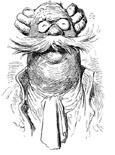
The Great Earwax Debate
LISTEN UP!
Earwax. Who’d ever have thought it could or would drum up a legislative din? But it did. America’s pack of yellow journalists somehow didn’t deem the story worth covering, so most Americans remain unaware of the sticky issues involved. But this is not just a matter for specialists and eggheads, so the story needs to be told beyond the precincts of technical legislative beat reporting and obscure professional newsletters.
If you remember your history, you know that Californians are susceptible to perceiving Yellow Perils. Well, nothing much has changed. Last year the California state legislature, already up to its ears in work, was set on its ear as audiologists and physicians found themselves at crossed Q-tips over the right to clean the wax out of the Golden State’s audial canals.
You heard correctly. The right to unclog ears became a matter of political moment in California. And we all know that as California goes, so goes the nation. (Pet rocks and mood rings proved that.)
So, friends, Americans, countrymen, lend me your ears while I recount how the struggle waxed and waned. There was existing law on the subject which made the removal of earwax a prerogative of physicians. The audiologists of California wanted a piece of that action, so they got a law proposed (State Senate Bill 407) that would cut them in. The physicians, anxious to protect their lode of yellow gold, objected. Now, the Hearing Aid Fitters and Installers had their ear to the ground, and when they heard what was happening they decided that if two could squeeze into an ear canal, three could as well.
You May Also Enjoy
Reviews of Time and Eternity... Moral Absolutes: Tradition, Revision and Truth... The Mystery We Proclaim: Catechesis at the Third Millennium... All God's Mistakes: Genetic Counseling in a Pediatric Hospital...
In our parlors, with our educated tongues, we deplore not only the Swaggarts of this world but all who attend them, and all who aren't quite "up" to us.
Trendy, "uncommon" children's names are actually quite common, revealing an odd type of conformity called "herd-like individuality" as well as a rush away from meaningful Christian names.

